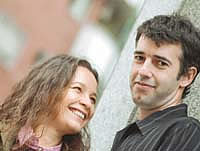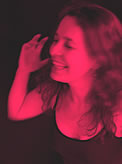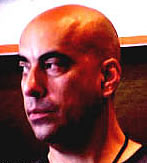Lucía Pulido
What are you doing in Buenos Aires, why did you come?
 Essentially, because I am lucky to share with a musician such as Fernando (Tarrés), a very talented person whom I respect a lot and who has a very particular style. Fernando, from the jazz field, is generating something that at some point goes beyond in a different way. It is complex for me to describe it because I feel he is inside a process and I have the luck to be just there, participating as one more instrument. There is a feedback. My singing pushes him to other paths and the same thing happens to me with his proposals. There is a permanent and professional challenge at several levels. We work with arrangements, tones, harmonies and concepts that requires a lot from me auditively. I mean, a lot. And with regard to interpretation, it is a great challenge for me to work with Argentinean tunes because I have always worked with Colombian music, not as an issue of nationalism but as a base to learn. And this is what I historically master. Even if I have listened to a lot of Argentinean folk tradition since I was a child, I have never worked with it. It is one thing to sing the traditional music of your own country. It is something very different to sing the tradition of another country. There, in fact, I always try to do my best and with a lot of respect.
Essentially, because I am lucky to share with a musician such as Fernando (Tarrés), a very talented person whom I respect a lot and who has a very particular style. Fernando, from the jazz field, is generating something that at some point goes beyond in a different way. It is complex for me to describe it because I feel he is inside a process and I have the luck to be just there, participating as one more instrument. There is a feedback. My singing pushes him to other paths and the same thing happens to me with his proposals. There is a permanent and professional challenge at several levels. We work with arrangements, tones, harmonies and concepts that requires a lot from me auditively. I mean, a lot. And with regard to interpretation, it is a great challenge for me to work with Argentinean tunes because I have always worked with Colombian music, not as an issue of nationalism but as a base to learn. And this is what I historically master. Even if I have listened to a lot of Argentinean folk tradition since I was a child, I have never worked with it. It is one thing to sing the traditional music of your own country. It is something very different to sing the tradition of another country. There, in fact, I always try to do my best and with a lot of respect.
But, with time you get more and more attached to those songs…
Probably, because I re-invent them since I am not a composer. I try to generate my own sound. There are many songs I decided not to sing because I cannot surpass the original version…
For example?
It can happen with some tangos… The tango versions I know are so good that if I cannot perform them in a radically different manner, I prefer not to sing them.
Haven´t you ever sung tangos?
I haven´t… The only one I have been able to sing and to re-invent was Nostalgias, but I did not dare record it.
Perhaps because the forms of tango are more “closed” than those of the folk tradition?
It is very probable. Tango has a very strong personality and a special accent in the words. All that is part of the tango and if you want to do it like it is, you disguise yourself, and… And besides… it is already done. And to innovate with that is very complicated.
 You have mentioned several times the word “to re-invent”. Why that need to re-invent?
You have mentioned several times the word “to re-invent”. Why that need to re-invent?
Certainly because I do not compose. It is my creative side.
And why don’t you compose?
Because it is a talent I do not have. I am permanently playing with my voice and inventing melodies and sounds; but to go on to a composition… that is where talent is needed. And there are so many great composers that I believe they are the ones that have to do that task. The very few times I have composed have been more by accident than because it has been my goal.
When you are seen onstage there are, in principle, two things: a strong transmission that comes either from the side of sadness or from that of happiness. The sadness is deep and the happiness exuberant. You, as a person, on what side are you placed?
Generally speaking, I think I am a person that does not go to extremes. I can do it, but it is not my natural state; I am quite stable and mentally calm. And musically, the songs ask you for a way and…
How is it that that a song “asks you“?
Of course… no song is sung as any other. Every song has to be interpreted… (she ponders); every song requires from you a state of mind and a physical vocal position. You will never be standing in the same position with two different songs.
Have you had to sing something for which you were just “not there”?
I try not to let it happen to me. I try not to sing songs with which I do not have any empathy.
Here we are in Buenos Aires, we speak Spanish, and if you sing Colombian folk tradition we will all understand. But you have been living for many years in the United States (twelve, mentions Lucía while she agrees)… I would like to know, first, why did you go live there, and what happens with the people that listen to you.
 (She thinks) Well… I did not really go to the United States… I went to New York (noisy laughter of the writer).
(She thinks) Well… I did not really go to the United States… I went to New York (noisy laughter of the writer).
It is something like saying I am in Buenos Aires but not in Argentina…
(Smiling) But the point is that I would like to be more time in Argentina; but I do not love the idea of being in the United States. I like New York. It is a very intense city where many things happen; and getting there was more a particular situation in my life than anything planned. I have never been interested in singing in English… When I sing in Spanish the same thing happens as when people in our countries listen to songs in English and do not know the language… We can all enjoy the songs, get excited with them…
But culturally speaking, we can agree that the established standards make American people more reluctant to accept something that is not in their language…
In the circuit I move in, people seek proposals such as mine. They are curious people, not the average American. It is people who arrive to a concert having looked for something. It´s like going to listen to an African musician without understanding one word of their language.
You are used to working with jazz musicians. Is it predetermined or has it happened randomly?
I think it started randomly. From the moment I arrived I got in touch with people already established in the jazz circuit and that became a network with other musicians. And at that very moment I just had to invent myself as a singer. I arrived in New York after having worked on a very established project in Colombia and I had to create my own project in New York. The only thing I had was my voice and a pile of ideas on how to work with the voice. It just so happened that as I got in touch with high-level musicians, domino effects began to occur little by little; they were years and years of a lot of work and maturing process…
 The project in Colombia you refer to is the one that you had with Iván (Benavides)?
The project in Colombia you refer to is the one that you had with Iván (Benavides)?
It is. It was the time of the new Latin-American song, a very special time. I always thought about the 80s as the insipid time I had to live, opposed to what had happened in the previous decades. And I felt we had to do something completely different from what existed. Many things happened in every country, the music of Charly Garcia, Chico Buarque, the Cuban trova arrived… and it was just then when Iván began to compose songs and it became a truly pretty, very intense, great time… and we also went out partying a lot (laughters).


Hello! I know this is kind of off topic but I was
wondering if you knew where I could get a captcha plugin for
my comment form? I’m using the same blog platform as yours and
I’m having problems finding one? Thanks a
lot!
It’s amazing to visit this web site and reading the views of
all colleagues concerning this paragraph, while I am
also eager of getting experience.